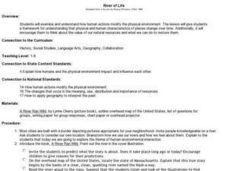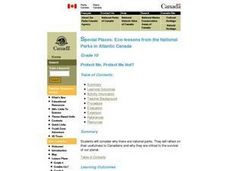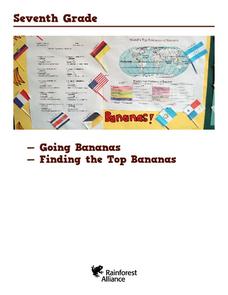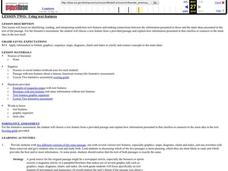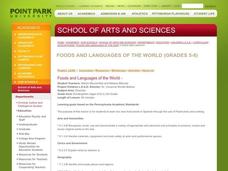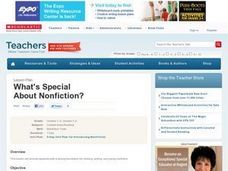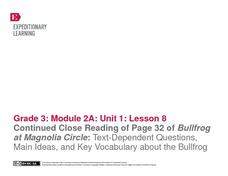Curated OER
Canada 2050: Future Population Trends
Young scholars analyze population data and a population pyramid projection for Canada. They make predictions of future society and economic trends.
Curated OER
Environment: River of Life
Students assess the impact of human activity on the environment. After reading the book, "A River Ran Wild," they role-play and discuss how people changed the river. Students write stories about living along a river from the point of...
Curated OER
Species and Spaces - At Risk at Home
Eleventh graders explore and compare Canadian biomes and investigate species at risk. They describe population growth and eco-regions in terms of climate and geography. They research and create presentations about the natural history and...
Curated OER
Survivor
Seventh graders investigate changes in the ecosystem within the school year. They see that ecosystems, communities, populations, and organisms are dynamic and change over time. They, in groups, collect data in quadrants in the fall,...
Curated OER
Weather Journal Log
Students discuss the weather each day and log it on a class chart for a month.
Curated OER
Eye Spy
Fourth graders examine how the human eye receives and transmits light from the environment. Through an activity, the students will discuss the importance of sight in our everyday lives.
Curated OER
Earthquake Unit
Eighth graders watch the "Earth, the Environment & Beyond" video on earthquakes. Take notes and give an oral summary. They build a working, two dimensional model of a strike-slip, thrust, or normal fault.
Curated OER
National Parks in Atlantic Canada
Tenth graders research and discuss factors that have an effect on the sustainability of national park ecosystems in Canada. They examine changes in thinking that have led to new park management practices.
Curated OER
Protect Me, Protect Me Not?
Students brainstorm natural resources found in Canadian National Parks. They, in teams, defend and support conservation efforts and give a presentation. Evaluation consists of speaking on both pro and con sides of a national parks' issue.
Curated OER
Honduras: Going Bananas
Students explore the popularity of bananas. They conduct a survey to understand the reasons for their popularity. Students research a banana's journey from the farm to school lunch. They compose a children's book about bananas explaining...
Curated OER
Colonizing the Stars
Students compare and contrast the size, composition and surface features of the nine planets of our solar system with the possible sizes and compositions of extra -solar planets.
Curated OER
People and Parks in the U.S.A.
Fifth graders explore the National Parks in the United States. After locating specified states, 5th graders predict which states have the most National Parks. Given the population of each state, students determine the average acre per...
Curated OER
Hurricanes-Disasters In the Making
Sixth graders discover the proper methods for plotting hurricanes while developing their understanding of hurricanes by researching and gathering tracking data from technological sources. Students develop a newsletter about hurricanes,...
Curated OER
Adopt a Geographic News Story
Learners explore geography and the environment by reading the news. They discuss why it is important to follow the news. Students adopt a geographic news story, research the topic, and design posters to illustrate the story.
Curated OER
Using Text Features
Fourth graders read a nonfiction story that is presented to them with graphic features, and presented to them with only the text. In this text features lesson, 4th graders decide what the benefits of text organizers are and create...
Curated OER
Egyptian Hireroglyphs
Fifth graders identify the aspects of Ancient Egyptians and Heiroglyphs. They compare and contrast Egyptian Hieroglyphs with the decimal number system. Students recognize the decimal number system and compares to bases other than ten.
Curated OER
Social Studies: African Banner Boxes
Students write creation stories and design stamps to use on banners accompany them. They discuss the use of stamps in African culture to take the place of words. Students use a handout of stamps and their own creations to create banners...
Curated OER
Volcanoes In Japan
Sixth graders study the characteristics of volcanoes in this unit. They apply the research to the study of three volcanoes in Japan. They complete mapwork, identify indicators of impending volcanic activity, and describe the dangers...
Curated OER
Foods and Languages of the World
Young scholars review Mexico's location and language and learn to pronouns 10 new Spanish food words. Students listen as the book, Corn is Maize is read, touching and passing around an ear of Indian corn. Young scholars discuss the...
Curated OER
Families and neighborhoods
Students create their house to add to a class "neighborhood". For this lesson on family and community, students read the book Family by Todd Parr and discuss how all families and houses are different. Then, students create their own...
Curated OER
President's Place
Third graders read and research the features of the White House.In this President's Place lesson, 3rd graders read an article determine the main idea. Students understand how to footnote an article.
Curated OER
What's Special About Nonfiction?
Young scholars examine the difference between nonfiction and fictional writing. They identify the characteristics of nonfiction literature and examine how a nonfiction textbook organizes information.
EngageNY
Close Reading of Bullfrog at Magnolia Circle: Text-Dependent Questions, Main Ideas, and Key Vocabulary about the Bullfrog
As your 3rd grade class finishes reading Bullfrog at Magnolia Circle, the eighth lesson plan of this unit helps readers from an understanding of the very specific information on the final page of the book. As with the entire unit,...
Curated OER
There's Omegas in Those Hemp Seeds
A very well-designed lesson plan focuses on the many benefits of Omega Fatty Acids. Learners read some articles on omega fatty acids, then access a glossary that is included in the plan. They fill in terms along with their definitions....

